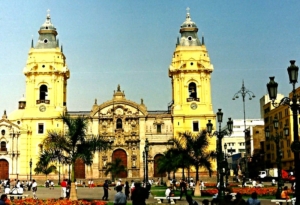Messengers of Peace Tackle Educational Gap in Peru

The COVID-19 pandemic made children in Peru, a large South American nation, more vulnerable to many effects of poverty. Namely, many children have lost access to quality education. A nonprofit organization called Messengers of Peace Peru has recently developed a program to address the educational gap in Peru while providing nutritional and psychological support.
Poverty in Peru — Recent Struggles
A 2023 World Bank press release examines the detrimental effect of COVID-19 on poverty in Peru. Poverty remains a risk for those who have escaped it, as four in 10 Peruvians are at risk of falling victim to poverty, the highest proportion in 19 years. In total, seven out of 10 Peruvians are poor or at risk of becoming poor, highlighting COVID-19’s effect on nearly two decades of substantial progress in poverty reduction.
Peru’s Post-Pandemic Education Gap
In the wake of the COVID-19 pandemic, the educational gap in Peru was evident. A September 2022 news article by Global Issues explains that many Peruvian families could not afford access to the Internet at home, meaning that the transition to remote learning in 2020 spelled the end of education for nearly 250,000 children.
Messengers of Peace Peru — The Purpose
Before diving into their recent work, here is some background on a nonprofit organization that looks to help Peru’s children. Messengers of Peace Peru looks to provide basic care to the country’s most vulnerable populations. The organization’s website gives a basic overview of its purpose: helping to elevate the quality of life for children living in extreme poverty as well as the elderly.
The scope of Messengers of Peace Peru’s work extends to several poverty-stricken districts and towns south of the nation’s capital of Lima, including the Chorrillos District as well as Barranco and Surco. Here, using initiatives built on “training and human development and the improvement of family living conditions,” the organization reports on its website that it impacts more than 200 children ages 6 through 12 years.
Recent Project Alleviates Educational Gap in Peru
Messengers of Peace Peru has acted upon a negative trend in education. Mireille Rebaza Sologuren, executive director of Messengers of Peace Peru, recently spoke with The Borgen Project. She explained that the pandemic created an “educational gap” in Peru, which the organization is addressing through a new learning development initiative for school-aged children.
Sologuren is the project manager for Integral Program School Support, which provides hands-on aid with learning development as well as nutritional and psychological support. The project benefits 200 children in the Chorrillos district of Lima, as well as their families, according to Sologuren.
Learning Development
The learning development initiative within the program has three tenets: homework support, a math program and a reading comprehension program. According to Sologuren, each child who participates is able to do homework with the help of a teacher. To accomplish this, members of Messengers of Peace coordinate with parents and teachers in their children’s schools.
The math program provides children with foundational mathematical skills. They learn the four basic operations as well as “mental arithmetic” and the application of each operation to “solve everyday problems,” said Sologuren to The Borgen Project.
Meanwhile, the foundation of the reading comprehension program is “reading for pleasure.” This simple strategy is used to help children “read fluently and understand texts according to their developmental level,” said Sologuren. The program uses enjoyment as a means of addressing the educational gap in Peru.
Additional Benefits: Nutritional and Psychological Health
Messengers of Peace Peru’s program also targets two other byproducts of poverty: food insecurity and mental health complications. Peru’s residents are particularly vulnerable to food insecurity. According to a 2022 United Nations news release, 51% of Peru’s population is food insecure, meaning that the quality of their diet has been compromised or they are not eating enough.
Through the nutrition program offered by Messengers of Peace Peru, children are served the nutrients they need. “All food dishes provided daily to the children have the nutrients and components in the required amounts,” said Sologuren to The Borgen Project. The meals contain 50% fruits and vegetables and an equal 25% in both proteins and carbohydrates.
Poverty and the pandemic contribute to mental health issues in young people. A study published in 2021 shows results from an August-October 2020 phone survey of people ages 19-25 in several developing nations. The rates of mild anxiety and depression as well as moderate/severe anxiety and depression were highest in Peru. The study points to factors such as social distancing in poor living conditions as contributing to these high rates.
Messengers of Peace Peru looks to tackle these issues before they can develop in children. According to Sologuren, children in the new program are able to access social skills workshops as well as individual therapy and counseling on a basis that meets their individual needs.
While Messengers of Peace Peru’s school support program is not able to alleviate poverty at its source, it provides support for children in key areas such as quality of education, nutrition and mental health. The ultimate goal of the program is to free children from the effects of the educational gap that COVID-19 and preexisting poverty brought on in Peru.
– Noel Teter
Photo: Flickr
